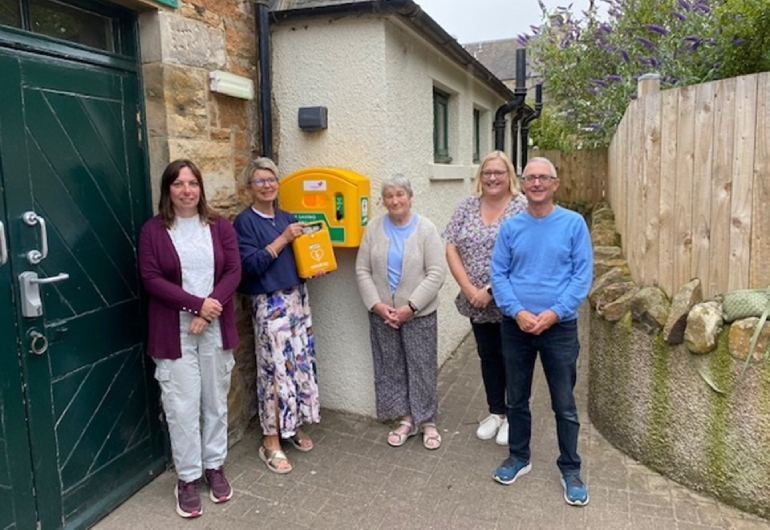Empowering a village – Aberlady’s defibrillator support Guardian team
In the village of Aberlady, East Lothian, Gaynor and Sue lead a team of eight defibrillator support Guardians who are working together to ensure their defibrillators are ready to save lives.

In the heart of Aberlady village, East Lothian, the efforts of Gaynor, Sue, and their team of defibrillator support Guardians have transformed the community’s approach to responding to a cardiac emergency. Their dedication to ensure defibrillators are visible, accessible and maintained has been pivotal in driving awareness of the lifesaving importance of defibrillators to a community.
Gaynor, a practice nurse, initiated the first defibrillator installation in the village ten years ago after speaking with local fundraisers at a charity event. The fundraiser’s life had been saved by a defibrillator in their community. Recognising the remote location of her own village and understanding that defibrillators had to be within a lifesaving distance for an ambulance service to deploy them, she planned and secured local grants. The pub landlord offered to house the first defibrillator in an external cabinet and cover the nominal electricity costs. This central location was just the beginning.
Sue joined the initiative almost three years ago, bringing her experience from an incident where she used the village’s defibrillator to attend to a cardiac arrest. Together, Gaynor and Sue set up a network of eight support defibrillator Guardians. The group fosters a sense of shared responsibility within the community. They use a rota to record their defibrillator status checks on The Circuit every month. If someone is unavailable to cover their slot, through holiday or illness, another member of the team can easily step in. The support Guardians communicate through WhatsApp and keep the wider community updated through the Facebook group.
Gaynor, Sue, and their team have expanded the network of defibrillators to three, ensuring they are strategically placed. They made an informed decision to house the defibrillators in unlocked cabinets, which are available 24/7 to ensure immediate access during emergencies.
‘By placing defibrillators in key locations and keeping them unlocked, we ensure that help is always within reach,’ says Gaynor. ‘Our network of support Guardians is vital in maintaining these lifesaving devices and fostering a community spirit of shared responsibility. Registering defibrillators on The Circuit and regularly recording status checks provides the ambulance service and the village with the confidence that the defibrillators are ready to use. It could save a life.’
Their approach is being shared within local community council areas and their coastal area partnership for other villages and towns nearby to consider implementing.

